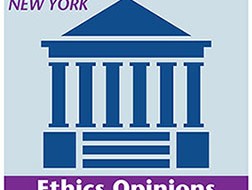Nassau Bar Committee Okays Tie with AmeriCounsel.com
By Lazar Emanuel [Originally published in NYPRR April 2001]
In Nassau County Bar Op. 01-04 (2/13/2001), the Professional Ethics Committee of the Bar Association of Nassau County issued an important opinion giving the green light, subject to a few conditions, to an attorney’s plan to affiliate with AmeriCounsel.com, a website that helps clients find lawyers and facilitates representation through Internet technology. This article reviews the opinion.
How AmeriCounsel.com Works
AmeriCounsel’s home page provides a menu of personal and business legal services, including “Divorce & Family Law,” “Wills & Trusts,” “Real Estate,” “Bankruptcy,” “Forming Your Business,” “Trademark & Copyright,” and “Employment & Labor.” A person who needs a will clicks on “Wills & Trusts,” which brings up a screen with basic information about wills. A click on “Wills and Trusts for Couples” brings up a menu of specific legal services for specified flat-fees — e.g., “Will for a Married Couple Requiring Trust Provisions” ($360); “Husband & Wife Pour Over Will and Living Trust” ($795); and “Life Insurance Trust” ($535).
To find local attorneys in AmeriCounsel’s network who perform the chosen service, the client punches in her zip code. Clicking on an attorney’s name brings up information about the attorney’s background, qualifications, and experience. Entering more zip codes brings up more attorney names. AmeriCounsel does not recommend any particular attorney — the client decides which attorney to choose.
Attorneys participating in the AmeriCounsel Attorney Network pay no fee to AmeriCounsel or anyone else. However, attorneys in the network must (1) be willing to interact with their clients through use of AmeriCounsel’s technology; (2) perform legal services for the fees posted on the website; and (3) have at least five years of practice, be in good standing, maintain an office in the state where the legal services will be performed, maintain malpractice insurance, and submit references.
After choosing an attorney, the client clicks on the “purchase” button and is asked for a credit card (for payment purposes) and the names of the parties to the matter (for conflict-checking purposes). But AmeriCounsel does not process a purchase until the client agrees to the terms of AmeriCounsel’s “User Agreement,” which informs clients that information the client provides to the site may not be privileged until the client communicates directly with the attorney. If the client accepts the User Agreement, she buys two distinct services: (1) representation by an attorney (the “Legal Service”), and (2) use of the website to facilitate the representation (the “Technology and Administrative Service”). The charges for both services are separately identified, and the site reminds clients that the attorney-client relationship is strictly between the client and the attorney, not between the client and AmeriCounsel.
Fees and costs are charged to the client’s credit card, but AmeriCounsel deposits the legal fee into the AmeriCounsel Trust and releases it when the attorney has completed the promised legal services to the client’s satisfaction. (AmeriCounsel’s “Satisfaction Guarantee Policy” says: “If you are unsatisfied with the quality of the service provided by your AmeriCounsel Network Attorney, you are entitled to a refund.”)
Before the attorney provides any legal services, AmeriCounsel sends the attorney (1) the client’s name, (2) a generic description of the matter (e.g., trust, divorce, etc.), and (3) the names of all the parties to the matter (e.g., buyer, seller, and broker). Before the attorney accepts the matter, the attorney must perform a “conflicts check,” which is consistent with DR 5-105(E). If the attorney can accept the matter, AmeriCounsel notifies the client, and the attorney directly provides the client with a retention letter. AmeriCounsel’s only further involvement is to provide its technology and administrative services, such as the “My AmeriCounsel” page, which allows the attorney and the client to review the progress of the matter, communicate with each other, and track the attorney’s time and expenses.
Once the matter is concluded, the attorney and client notify AmeriCounsel, which asks the client to complete a “customer satisfaction form.” Unless the client expresses dissatisfaction with the quality of the legal services, AmeriCounsel directs the AmeriCounsel Trust to release the legal fee.
Ethics Committee’s Analysis
The Committee was asked: “Is it ethical for an attorney to affiliate with the described on-line legal services-related website, and to accept referrals from it?” It answered: “Subject to stated qualifications, an attorney may affiliate with the described on-line legal services-related website.”
The Committee first tested AmeriCounsel against DR 2-103(B), which provides that a lawyer shall not “give anything of value to a person or organization to recommend or obtain employment by a client…” The Committee responded:
Since attorneys do not “compensate or give anything of value” to AmeriCounsel for participating in the Attorney Network, their participation is not prohibited by DR 2-103(B). … In addition, AmeriCounsel does not “recommend” lawyers or “obtain employment” for them… Rather, AmeriCounsel functions as an advertising service or directory for attorneys who meet certain criteria… The AmeriCounsel User chooses the attorney from among those who advertise on AmeriCounsel’s website. AmeriCounsel does not influence or control that choice.
The Committee next analyzed DR 2-103(D), which provides that a lawyer “may be recommended, employed, or paid by, or may cooperate with one of the following offices or organizations which promote the use of the lawyer’s services …” The listed offices include legal aid offices, public defender offices, and a “lawyer referral service operated, sponsored or approved by a bar association or authorized by law or court rule.” AmeriCounsel did not fit the listed categories, and New York has not yet adopted any “law or court rule” permitting anyone but a bar association to operate a “referral service”— but since the attorneys in AmeriCounsel’s Attorney Network are not “recommended, employed or paid by” AmeriCounsel, and instead are chosen by clients, DR 2-103(D) “is not triggered.”
The Committee also noted that DR 2-103(D) is entirely permissive and does not contain any “shall not” language. The Committee therefore said:
[W]e believe DR 2-103(D) should not be read as prohibiting all recommendations except recommendations by one of the listed entities. Instead, we believe it is merely one “safe harbor” that expressly provides that a recommendation from one of the listed entities, even if it is paid for by the attorney, is not prohibited. However, nothing in this rule prohibits a recommendation for which an attorney does not give compensation or anything of value to the recommending entity, even if that entity is not the type listed in DR 2-103(D).
Absence of payment to AmeriCounsel was a key factor. The Committee found no New York cases or ethics opinions finding a violation of DR 2-103(D) “if a lawyer did not pay any fee or other consideration to the organization in question.” To the contrary, an attorney’s plan to include advertising material in an “information package” that a car dealer would give to car buyers was approved in N.Y. State Bar Op. 659 (1994) precisely because the attorney would not pay a fee to the car dealer.
Summing up its reasoning, the Nassau Bar Committee said:
[S]ince AmeriCounsel does not charge attorneys any fee and since AmeriCounsel does not “recommend” or “promote” the use of any particular lawyer ‘s services, it does not fall within the purview of DR 2-103(B) or (D). Rather, AmeriCounsel is a form of group advertising permitted by the Code of Professional Responsibility and by ethics opinions interpreting the Code.
The Committee then elaborated on the “group advertising” idea, analogizing AmeriCounsel to ads for an “800” number on television. Such ads were approved in N.Y. State Bar Op. 597 (1989) as long as the ad “presents in a meaningful fashion the names of the lawyers or law firm participating in the group advertisement, along with their addresses …, so that the potential client knows the identity of the lawyer to whom his call will be referred and there is no discretion in referrals on the part of the advertising agent.” AmeriCounsel’s website fits this model, but “gives clients even more choice” because it does not assign exclusive geographical areas to any attorney, and “gives clients far more information than joint advertising on television …”
No Fee Sharing, But Some Improper Advertising
The Committee next concluded that AmeriCounsel did not involve any improper fee sharing between lawyers and non- lawyers. “Rather, lawyers in AmeriCounsel’s Attorney Network keep their entire legal fee, and clients pay a completely separate fee to AmeriCounsel to provide a valuable non-legal Technology and Administrative Service.”
However, the Committee did not approve of certain specific language in the website, such as “unparalleled,” “prominent,” and “prestigious” to describe AmeriCounsel’s Attorney Network or Legal Advisory Council. The Committee also noted that attorneys signing up for AmeriCounsel’s Network “must ensure that the website complies with 22 NYCRR Part 1400, Procedure for Attorneys in Domestic Relations Matters.” For example, attorneys in AmeriCounsel’s network must inform domestic relations clients of the right to arbitrate a fee dispute.
What Does Opinion Mean?
The Nassau Bar Ethics Committee’s opinion about AmeriCounsel is significant because it generally approves one of the most advanced legal services sites on the Internet. The opinion establishes that a lawyer may affiliate with a for-profit group advertising website on the Internet as long as the lawyer does not pay the website for specific referrals, the client remains completely free to choose from among the listed attorneys, and the website does not recommend or promote any specific attorney.
Lazar Emanuel is the Publisher of NYPRR.
DISCLAIMER: This article provides general coverage of its subject area and is presented to the reader for informational purposes only with the understanding that the laws governing legal ethics and professional responsibility are always changing. The information in this article is not a substitute for legal advice and may not be suitable in a particular situation. Consult your attorney for legal advice. New York Legal Ethics Reporter provides this article with the understanding that neither New York Legal Ethics Reporter LLC, nor Frankfurt Kurnit Klein & Selz, nor Hofstra University, nor their representatives, nor any of the authors are engaged herein in rendering legal advice. New York Legal Ethics Reporter LLC, Frankfurt Kurnit Klein & Selz, Hofstra University, their representatives, and the authors shall not be liable for any damages resulting from any error, inaccuracy, or omission.
Related Posts
« Fee Arbitration Rules to Take Effect June 1, 2001 Primer on Trust Accounts — Don’t Use Money & Do Keep Records »












